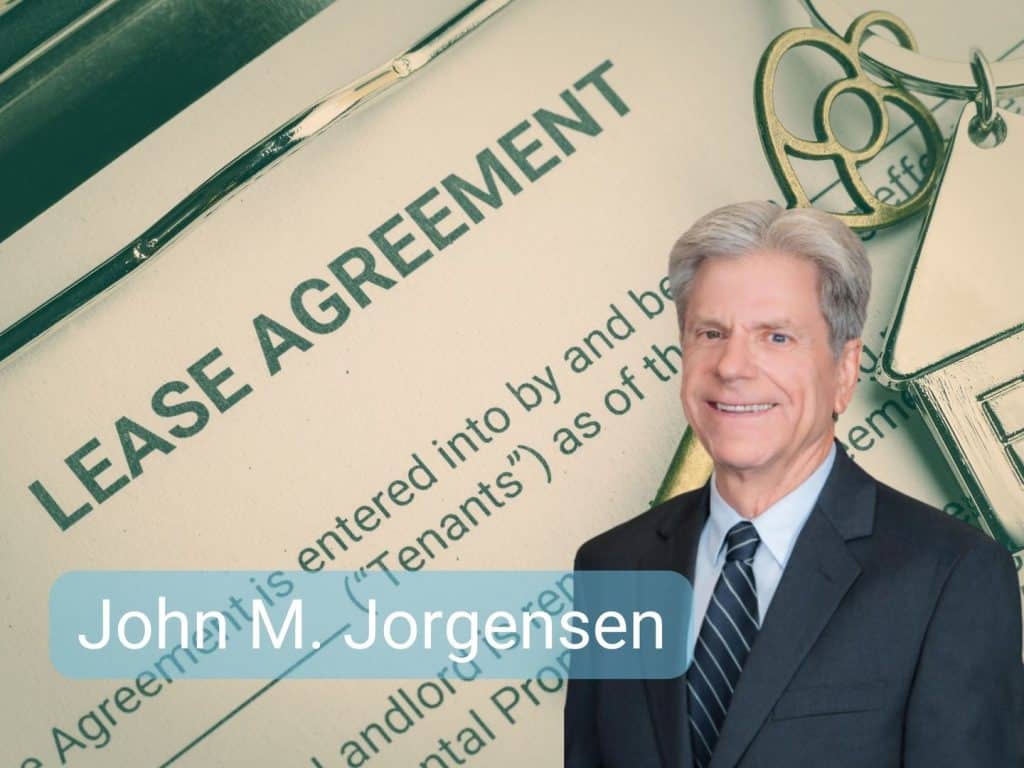Ever found yourself stuck in a tug-of-war with your landlord or tenant? It’s like being caught in a thunderstorm without an umbrella, isn’t it?
You might be asking “How?” Well…imagine having a map that guides you smoothly through choppy dispute waters. Now hold onto that thought because what if I told you such a guide exists?
Stick around as we unlock practical steps to fix those pesky issues, highlight legal rights of both parties involved and show how expert help can save the day! Let’s start navigating!
Schedule your consultation with a specialist like John M. Jorgensen. It’s your time to secure peace of mind and a favorable outcome in your landlord-tenant relationship. Consult a Landlord/Tenant Dispute Expert Today! Your living situation or rental business shouldn’t be left to chance. Take the step that could make all the difference.
Table Of Contents:
- Understanding Landlord/Tenant Disputes
- Common Types of Landlord/Tenant Disputes
- Legal Rights and Responsibilities
- Steps to Resolve Disputes
- Role of Attorneys in Dispute Resolution
- Case Studies in Landlord/Tenant Disputes
- Resources for Navigating Landlord/Tenant Disputes
- The Impact of Disputes on Landlords and Tenants
- FAQs in Relation to Navigating Landlord/Tenant Disputes: a Guide
- Conclusion
Understanding Landlord/Tenant Disputes
Landlord/tenant disputes are a common part of renting property. They can range from disagreements over rent payment, to issues with maintenance and repairs.
A dispute often starts when one party feels their rights have been violated. A landlord may experience frustration if the tenant has not adhered to conditions such as making timely rent payments or keeping the rental unit in an orderly state. On the other hand, tenants may believe they’re being unfairly treated if landlords fail to carry out essential services such as fixing broken appliances or addressing safety concerns.
In any case, understanding these disputes is crucial for both parties to navigate them effectively and reach an amicable resolution.
Common Types of Landlord/Tenant Disputes
Disagreements between landlords and tenants often stem from similar issues. Let’s break them down:
- Security Deposits: The return of security deposits is a common cause for dispute. Tenants may feel they are owed their full deposit back, while landlords might deduct charges for damages or unpaid rent.
- Maintenance and Repairs: Who should fix what? Confusion over this can lead to conflict. Tenants expect the property to be maintained properly, but landlords aren’t always quick to address these concerns.
- Evictions and Lease Terminations: Sometimes landlords need to evict tenants who violate lease agreements, but eviction isn’t straightforward – it must comply with specific legal procedures.
Remember that understanding your rights and responsibilities helps prevent disputes before they start.
Legal Rights and Responsibilities
The relationship between landlords and tenants is regulated by specific laws. Tenants have rights, such as the right to a habitable home (Nolo). But they also carry responsibilities like paying rent on time.
Landlords are obligated to maintain property standards but can evict for valid reasons (HUD). It is essential to be aware of these legal limits, as disagreements often arise when one person believes their rights have been disregarded.
If you’re unsure about your position in a dispute, reaching out to an attorney like John M. Jorgensen can help clarify things. His expertise lies in navigating landlord/tenant disputes with knowledge of the intricate rules involved.
Steps to Resolve Disputes
The first step in resolving landlord/tenant disputes is open communication. Discuss the matter in hand, and seek to discover a mutual understanding.
If talking doesn’t work, consider getting help from a mediator. Mediators are neutral third parties who can guide conversations and facilitate agreement.
In more complex cases, you might need legal advice. Attorneys like John M. Jorgensen, specializing in Landlord/Tenant Disputes, can provide guidance on your rights and next steps.
Role of Attorneys in Dispute Resolution
When landlord/tenant disputes heat up, attorneys like John M. Jorgensen, who specialize in this field, can offer invaluable help.
Their knowledge and experience allow them to guide both parties through the complex legal landscape. This is much like using a compass to navigate an unfamiliar forest; it provides direction when you need it most.
A good attorney not only knows how to negotiate but also understands laws related specifically to your dispute – whether that’s about security deposits or lease termination issues.
Case Studies in Landlord/Tenant Disputes
The real-world examples can offer practical insights into how disputes get resolved. Let’s look at two cases where the intervention of an attorney like John M. Jorgensen proved pivotal.
A Security Deposit Standoff
In one case, a tenant couldn’t retrieve their security deposit from a landlord who alleged property damage beyond normal wear and tear. After failed attempts to fix it themselves, they sought legal help.
An Unresolved Repair Issue
In another scenario, the tenant complained about necessary repairs being ignored by their landlord for months. Legal action was needed to make sure the issues were addressed promptly.
Resources for Navigating Landlord/Tenant Disputes
Navigating landlord/tenant disputes can feel like trying to find your way in a maze. But, with the right resources at hand, it’s more manageable.
You may want to start by brushing up on federal tenant rights. Knowledge is power and understanding your rights will help you navigate any dispute effectively.
Support organizations such as Tenants Union are also great allies. They provide free counseling services and can give advice tailored to your situation.
Schedule your consultation with a specialist like John M. Jorgensen. It’s your time to secure peace of mind and a favorable outcome in your landlord-tenant relationship. Consult a Landlord/Tenant Dispute Expert Today! Your living situation or rental business shouldn’t be left to chance. Take the step that could make all the difference.
The Impact of Disputes on Landlords and Tenants
Disputes between landlords and tenants can have a serious effect on both parties. They can have real emotional, financial, and legal impacts for both parties involved.
Tenants may feel stress or anxiety if they’re not sure where they’ll live next. They might even lose personal belongings in an eviction process. On the other hand, landlords could face significant losses from unpaid rent or property damage.
To avoid such negative outcomes, it’s crucial to seek help early in the dispute process. Legal professionals like John M. Jorgensen, who specializes in landlord/tenant disputes, can provide valuable guidance to ensure fair resolutions are reached.
FAQs in Relation to Navigating Landlord/Tenant Disputes: a Guide
How do you handle a dispute between two tenants?
You should mediate the issue, encourage open communication, and seek professional help if necessary. Respect for each other’s rights is crucial.
What is a landlord dispute?
A landlord dispute arises when there’s disagreement about lease terms or property issues between landlords and tenants.
Conclusion
But now, you’re armed with knowledge and resources to help smooth out the rough patches. From understanding common types of disputes to knowing your legal rights and responsibilities, we’ve covered it all.
Remember that effective communication is key. If things get tough, don’t shy away from seeking professional help – a seasoned attorney could be just what you need!
You’ve also got a toolbox full of resources at your disposal for further assistance in resolving these issues. And let’s not forget about those real-world case studies – they provide invaluable insights into dispute resolution.
Schedule your consultation with a specialist like John M. Jorgensen. It’s your time to secure peace of mind and a favorable outcome in your landlord-tenant relationship. Consult a Landlord/Tenant Dispute Expert Today! Your living situation or rental business shouldn’t be left to chance. Take the step that could make all the difference.












